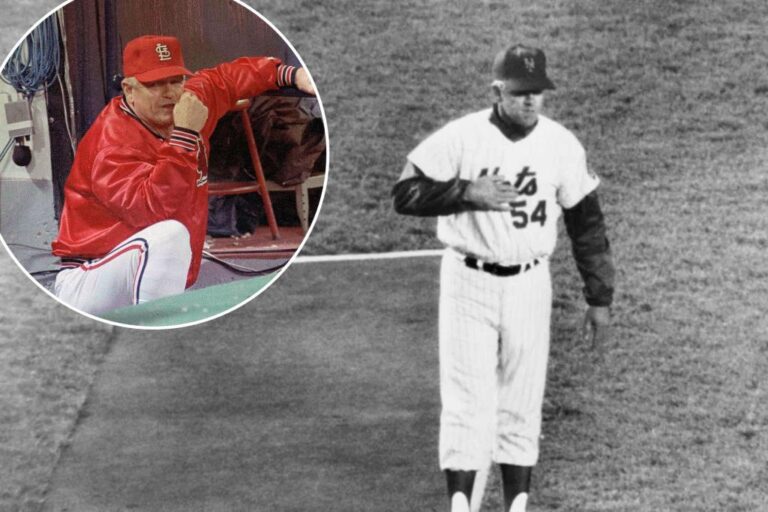
[ad_1]

The great irony, of course, is that long before Whitey Herzog became one of the Mets’ forever nemeses, he was, in fact, one of their founding fathers. Before he did more than any external force to deprive the Mets of the destiny status they seemed destined for in the ’80s, he was an internal dynamo that helped craft a champion.
It was Herzog, who died Tuesday at age 92, who discovered and developed so many pieces of the teams who stunned the world with a championship in 1969 then came within one game of doing it again in ’73, in his time as the team’s farm director.
He arrived brash, and he never lost that. When he first took the job as Wes Westrum’s third-base coach in 1966, he announced, “A good third-base coach should be able to win 16 or 17 games a year for his club.” And though that might’ve been ambitious, the Mets did escape last place for the first time in their history that year, and lost fewer than 100 games for the only time in their first six years.
In 1967 he was promoted to the front office, and his keen eye stocked the rosters of Mets teams that were finally able to break free from their horrific beginnings.
“Whitey was like a wizard,” Ed Kranepool said five years ago, during one of many celebrations saluting the ’69 Mets. “He just had a knack of knowing if you could play or if you couldn’t, if you were a fit for the organization or you weren’t.”
It was widely assumed Herzog — who burned to manage — would succeed Gil Hodges around 1973 or ’74, whenever Hodges decided to move into the GM chair at Shea Stadium. But Hodges’ sudden passing on April 2, 1972, provided a fateful sliding-doors moment that permanently altered the course of the team and the man its followers would later fearsomely dub “the White Rat.”
For when Hodges died, an obscure front-office suit named M. Donald Grant assumed imperial control of the team. Herzog, never one to carefully edit himself, had once thundered, “M. Donald Grant doesn’t know beans about baseball!” That got back to Grant. So not only was he bypassed in favor of Yogi Berra, he was told by Grant that he wasn’t welcome at Hodges’ wake or his funeral.
“The most despicable thing that’s ever happened to me,” Herzog told me in 1998, on the eve of his induction to the Kansas City Sports Hall of Fame. “I’ll never forget that. And I never forgave that.”
He left the Mets shortly thereafter and soon found a home in Kansas City where, George Brett once recalled, “He taught 25 players and a couple of million citizens how to play baseball like professionals.” By 1981 he moved across the state, to St. Louis, and by ’82 he led the Cardinals to their first world championship in 15 years.
It was a year later when Herzog agreed to deal Keith Hernandez to the Mets — so involuntarily he actually helped fortify a second title team in Queens. But even after that, he took great delight in torturing and tormenting the Mets and their fans, guiding Cardinals teams in both 1985 and ’87 that outlasted the Mets in close pennant races.
“I bled orange and blue to my soul,” Herzog told me in ’98. “And then they cut my head off. All’s fair in love, war and baseball.”
Herzog made the Hall of Fame in 2010, probably should have been there sooner. As of now, there isn’t one artifact of Herzog’s in the Mets’ museum at Citi Field. That feels like an oversight that ought to soon be corrected, too.
[ad_2]
article credit